Ready to graduate from the world of classwork and essays to the exciting world of… job applications?
You’ve aced your exams, mastered the art of late-night essay writing, and conquered group projects. Now it’s time to tackle your CV – it’s a bit like coursework, but this one could pay off in cash, not grades.
This guide, complete with several Student CV examples, will help you craft a CV that highlights your education, skills, and potential, setting you up for success as you take your first steps into the job market.
Student CV
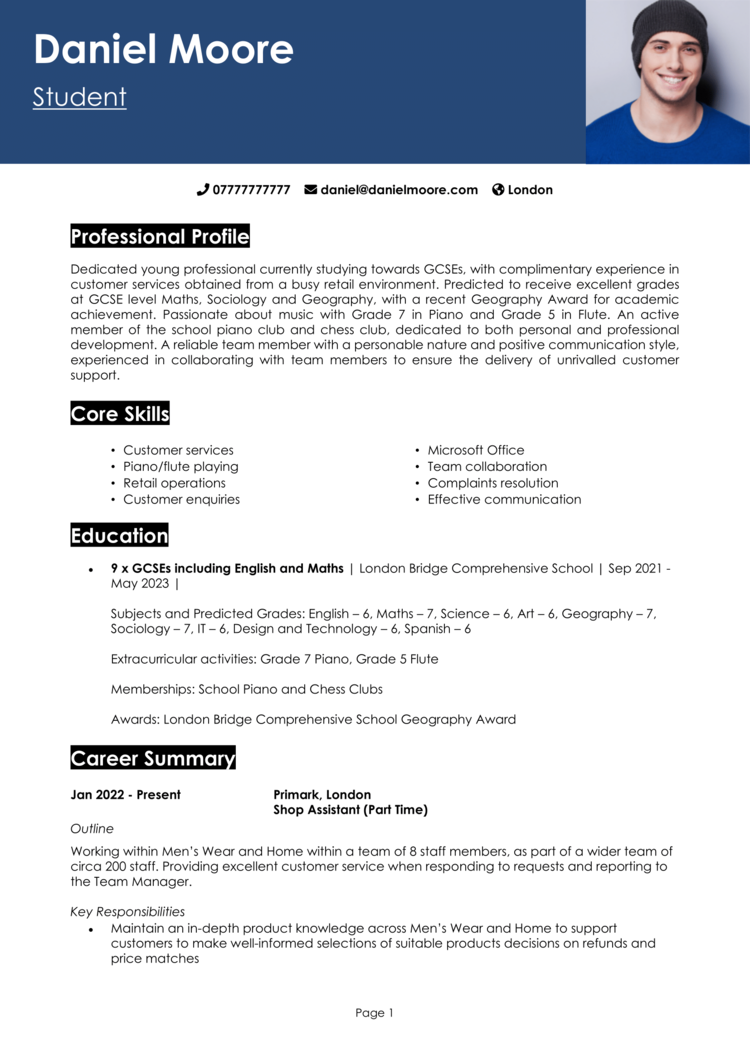
Student (no experience) CV

A Level Student CV
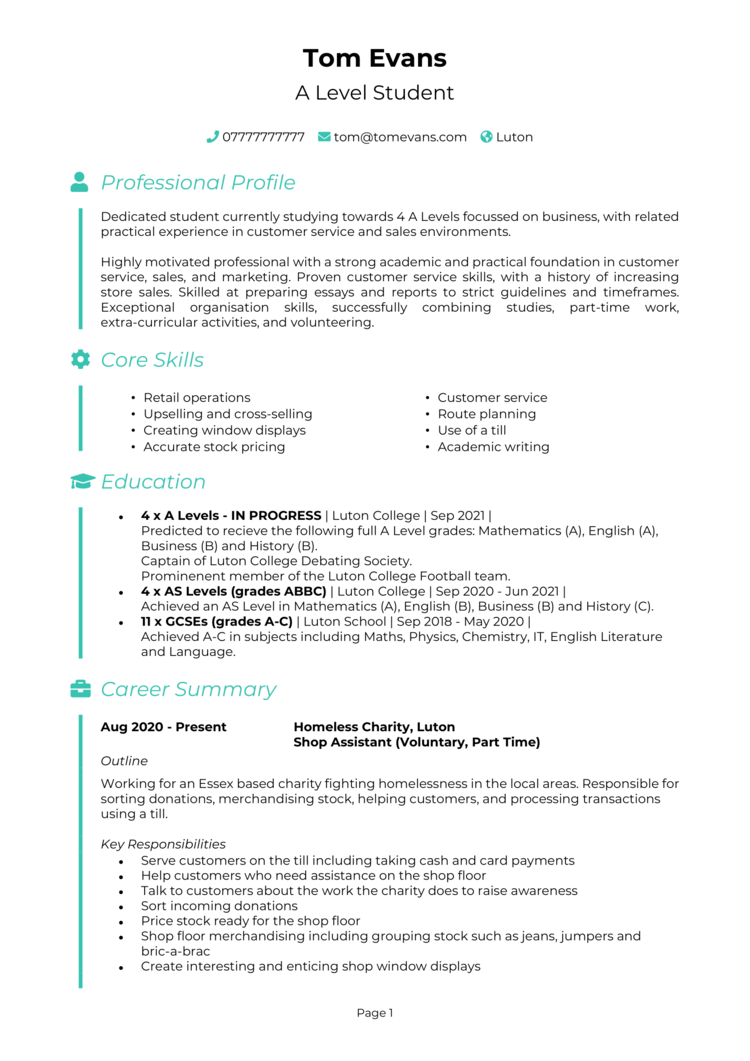
University Student CV
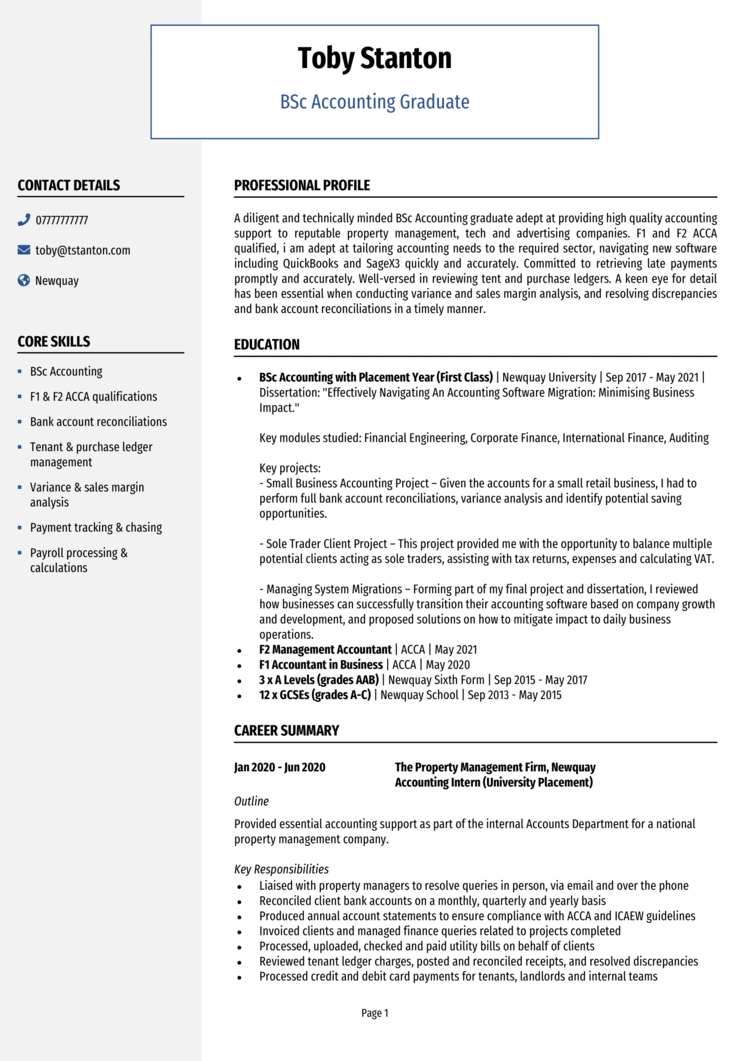
Internship CV
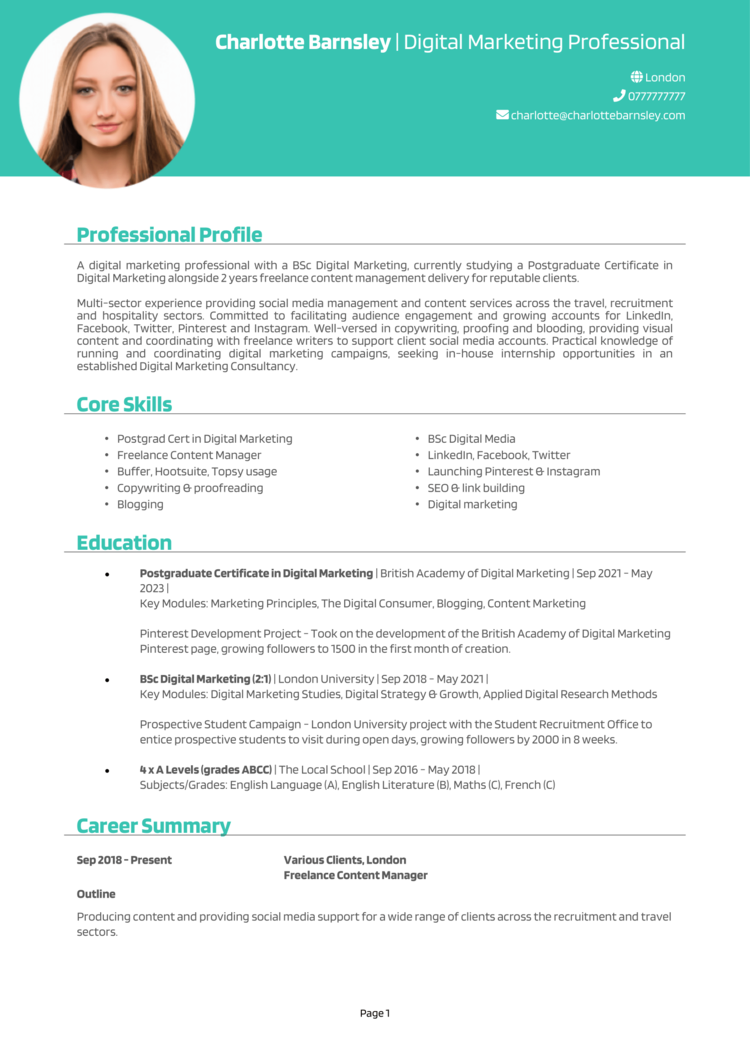
Finance Student CV
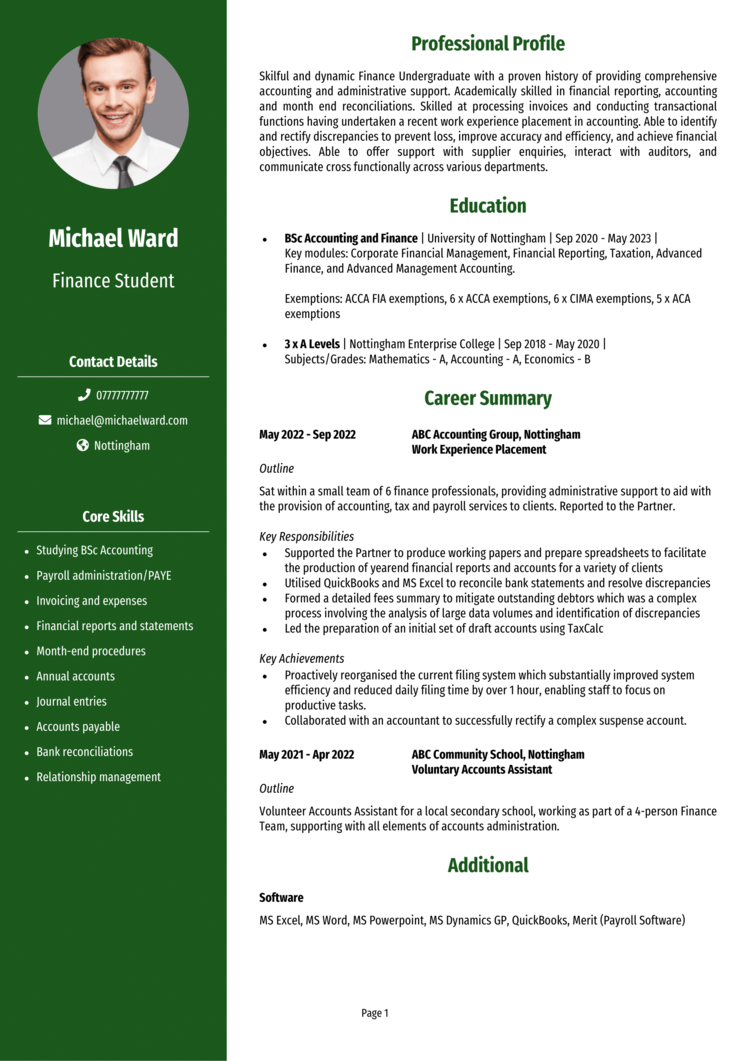
Law Student CV
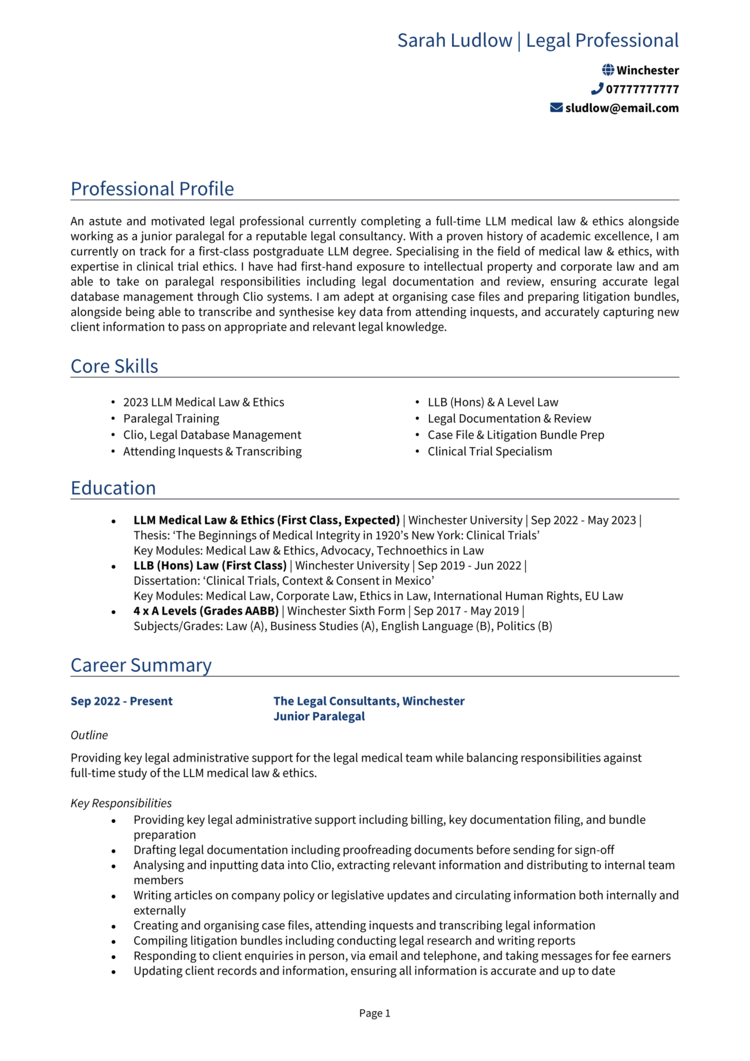
Master’s Student CV
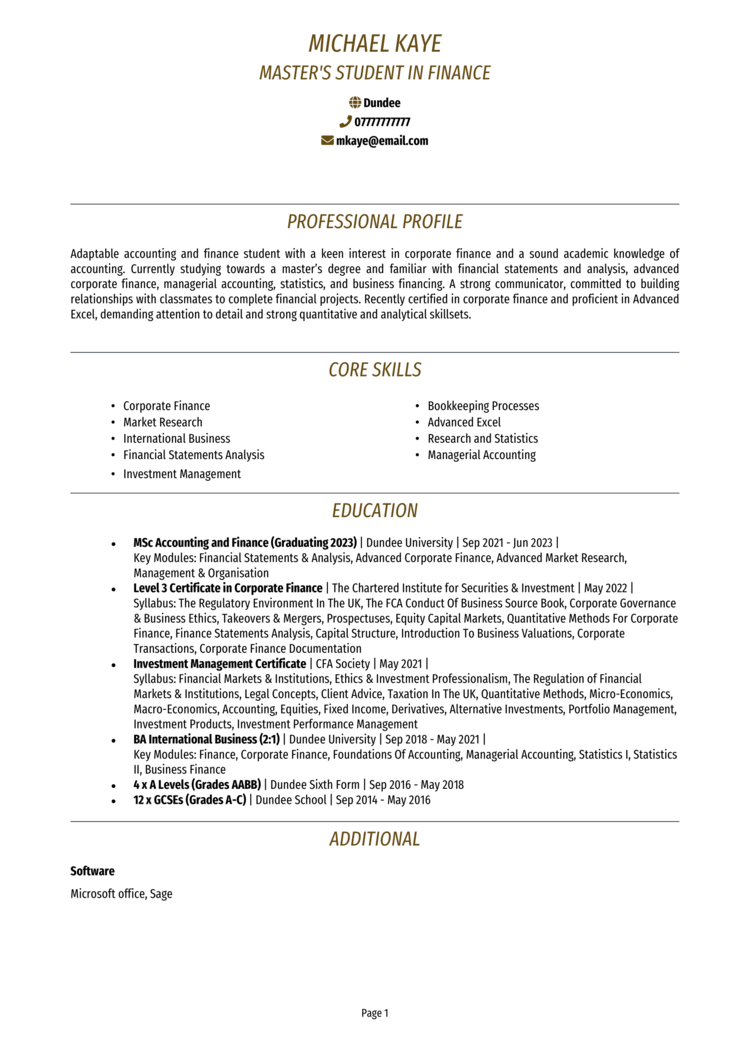
Medical Student CV
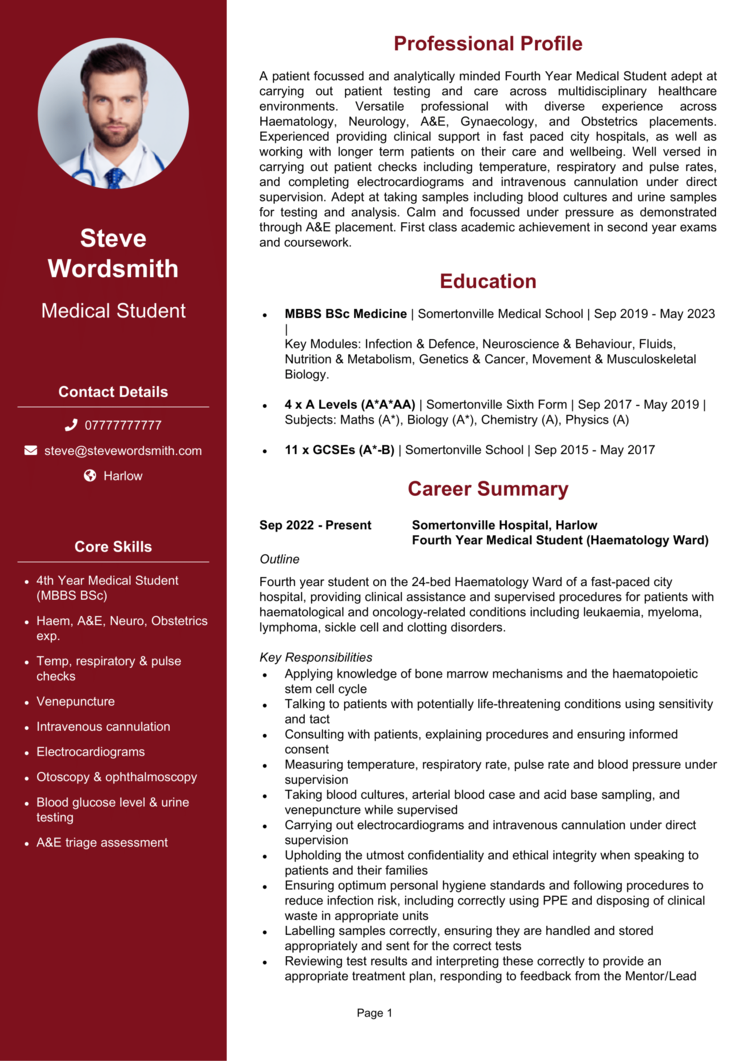
Occupational Therapy Student CV

Interior Design Student CV

Dental Student CV
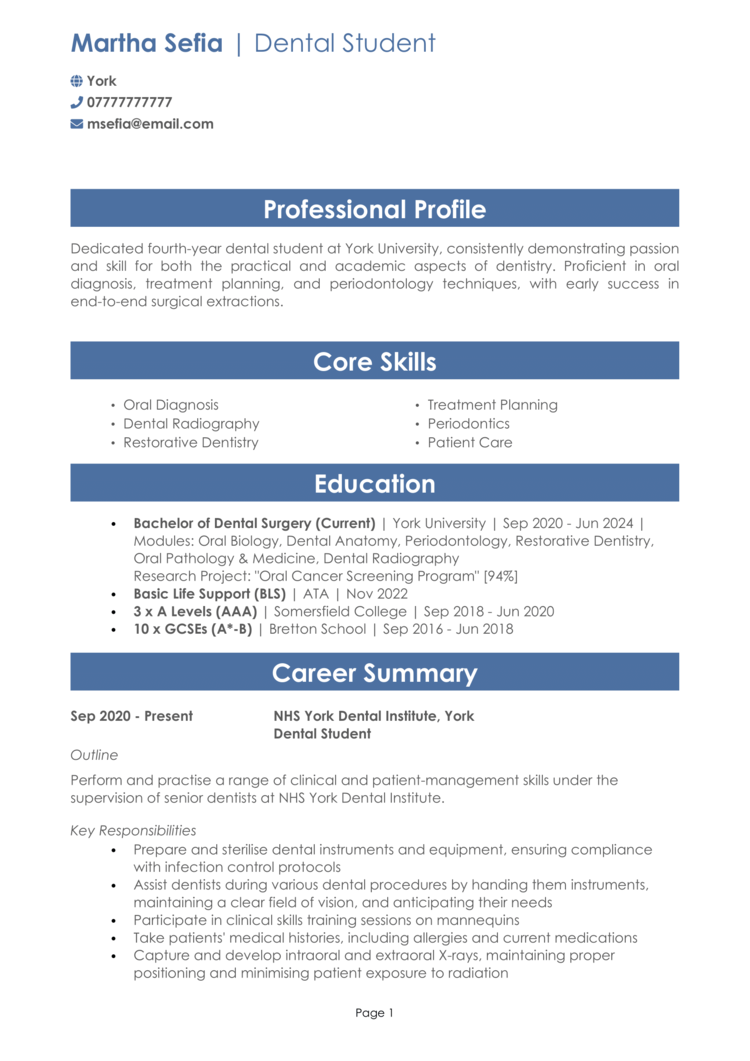
How to write your Student CV
Learn how to create your own interview-winning Student CV with this simple step-by-step guide.
Writing a CV as a student might feel daunting, but you’ve already got the building blocks to create something great. From academic achievements to extracurricular involvement, your experiences are more valuable than you think.
Whether you’re a graduate, teenager, or a recent school leaver, this guide will show you how to highlight your skills and accomplishments, even if your work experience is limited, and create a CV that makes recruiters excited to learn more about you.
Student CV structure


Your CV should be as organised as your colour-coded study notes – or at least how you planned your study notes to look before exam season. Recruiters need to see your potential at a glance, so keep things organised and easy to read.
Here’s how to structure your Student CV:
- Name and contact details – These personal details go at the top to ensure employers can reach you easily. A photo is optional.
- Profile – Also known as your personal statement, here you’ll summarise your academic achievements, skills, and future goals.
- Core skills – Highlight your transferable abilities, like teamwork, communication, and research.
- Work experience – List internships, part-time jobs, or volunteer work in reverse chronological order.
- Education – Emphasise your degree, key coursework, and other academic achievements.
- Additional info – Optionally, include hobbies and interests that showcase your personality and skills.
The best way to format your Student CV


Your CV should look as professional as you’ll feel on your first day in your new role. Remember, formatting mistakes can make even the best content look sloppy, so keep your CV neat and professional, especially if it’s your first.
Here’s how to format your Student CV:
- Bullet points – Use these to break down your achievements and responsibilities into a nice, clear layout.
- Divide sections – Headings help recruiters find the information they need quickly.
- Use a clean font – Opt for readability and professionalism with your font to keep your CV looking polished.
- Keep it the right length – Stick to no more than 2 pages to keep your application concise and engaging.
How to write a Student CV profile


Your CV profile, or personal statement, is the perfect place to summarise your strengths, ambitions, and unique qualities. For a student, this is your chance to highlight your academic achievements and career aspirations while giving recruiters a glimpse of your personality.
Student CV profile examples
Profile 1
Organised secondary school student excelling in mathematics and science, with a keen interest in pursuing a career in engineering. Skilled in collaborative teamwork, time management, and research, with experience participating in science fairs and robotics competitions.
Profile 2
Dedicated undergraduate student studying Business Administration, focusing on marketing and management. Skilled in using Microsoft Office Suite, conducting market research, and preparing presentations. Actively seeking opportunities to gain practical experience and contribute to organisational success.
What to include in your Student CV profile
Here are some tips on what to include in your personal statement:
- Where you’ve studied – Mention your school, college, or university.
- Your top qualifications – Highlight your degrees, relevant coursework, or academic awards.
- Key skills – Include transferable abilities like research, problem-solving, and communication.
- Career aspirations – Briefly state what you hope to achieve or the field you want to enter.
- Extracurricular activities – Reference clubs, societies, or volunteer work that showcase your initiative or leadership.
Core skills section


Your core skills section is a quick way to show recruiters what you bring to the table.
For students, this might include soft skills, technical abilities, or specific expertise gained through coursework or projects. Tailor this section to the job description to make your application as relevant as possible.
Need help creating a student CV with little experience?
Check out our CV builder for beginner-friendly templates, pre-written content, and expert guidance to highlight your skills and potential.
Top skills for your Student CV
- Research and Analysis – Gathering and interpreting data to produce clear insights.
- Time Management – Juggling deadlines, extracurriculars, and coursework efficiently.
- Presentation Skills – Delivering concise, engaging presentations to peers or professors.
- Team Collaboration – Working effectively in group projects to achieve shared goals.
- Technical Proficiency – Familiarity with Microsoft Office, Google Workspace, or coding tools.
- Data Interpretation – Analysing trends and patterns in academic or project data.
- Report Writing – Preparing well-structured and detailed academic reports.
- Creative Problem-Solving – Finding innovative solutions to challenges in academic settings.
- Leadership – Leading societies, organising events, or mentoring peers.
- Adaptability – Thriving in new environments and tackling challenges head-on.
What should your CV’s education section include?


The education section is the cornerstone of a student’s CV. It should highlight your academic background, key modules, and any standout achievements.
You’ve got a golden opportunities to convey to the recruiters what skills and knowledge you’ve attained, and how these will help them if they hire you.
List your qualifications in reverse chronological order, starting with your most recent. Be sure to include more detail on coursework or projects that demonstrate relevant skills for the role you’re pursuing.
Example education sections
Education 1
BSc Computer Science | University of Birmingham | Sep 2022 – Present Currently pursuing a degree in Computer Science with a focus on programming, data structures, and software development. Expected graduation: June 2025.
3x A-Levels | Birmingham Sixth Form College | Sep 2020 – June 2022 | Mathematics (A), Physics (B), Computer Science (B) |
9x GCSEs including English and Maths | Leicester Comprehensive School | Sep 2018 – June 2020
Education 2
7x GCSEs including English and Maths | Birmingham Academy | Sep 2022 – June 2024 Predicted Grades: English (6) Mathematics (7) Science (6) ICT (6) Geography (7) Religious Studies (7) IT (6) Design & Technology (6) Spanish (6)
What to include in your education section
For each qualification, add the following info:
- Qualification & organisation – Mention where you earned your qualifications, and what they were.
- Dates studied – State when you began studying for each qualification, and the date you finished.
- Extra details – Provide more detail for recent and relevant qualifications – demonstrate how they taught you the skills necessary to excel at whatever role it is you’re applying for.
Recommended qualifications for Students
- A-Levels or Equivalent – Foundational qualifications demonstrating academic capability.
- Undergraduate Degree – Focus on your area of study and key modules.
- Extracurricular Certifications – Skills-based qualifications like first aid or leadership training.
- Coding or Digital Certificates – Basic training in programming languages or digital tools.
- Online Courses (Coursera, Udemy, etc.) – Additional training in relevant fields like design, analytics, or marketing.
Work experience


Think of the work experience section as the practical side of your academic history – it’s your chance to prove you’ve got skills beyond just cramming for exams.
Even with limited or no experience, focus on transferable skills and responsibilities: talk about work placements, volunteering, or any extracurricular activities you’ve worked hard for.
List your roles in reverse chronological order, and don’t hesitate to include internships, volunteering, or even significant academic projects. If there are any particularly pertinent roles, feel free to break the order a little to really emphasise them.
How to format previous jobs in your CV correctly

- Outline – Provide a brief overview of the organisation or project, your role, and its scope.
- Responsibilities – Highlight tasks like customer service, event planning, or data entry. Use action verbs like “organised,” “assisted,” or “delivered.”
- Achievements – Mention any measurable outcomes, such as meeting targets or receiving positive feedback. Include numbers where possible to add impact.
Example jobs for Student
Retail Assistant | CityMart
Outline
Worked part-time as a retail assistant while completing academic studies, gaining experience in customer service, sales, and inventory management. Focused on delivering exceptional service to customers.
Responsibilities
- Assisted customers with inquiries and provided product recommendations.
- Handled cash and card transactions, ensuring accuracy and efficiency.
- Restocked shelves and maintained a clean and organised store environment.
- Monitored inventory levels and reported low-stock items to the supervisor.
- Collaborated with team members during busy periods to maintain smooth operations.
Achievements
- Improved checkout speed by 20 percent during peak hours through efficient processing.
- Consistently received positive feedback from customers for excellent service.
- Recognised by management for reliability and flexibility in covering shifts.
Work Shadowing | Greenleaf Consultancy
Outline
Shadowed environmental consultants during a week-long volunteer placement, gaining insight into sustainability practices and environmental impact assessments. Supported team activities and contributed to small-scale projects.
Responsibilities
- Attended client meetings to observe discussions on sustainability strategies.
- Assisted in collecting and organising data for environmental impact assessments.
- Conducted research on green initiatives and prepared summaries for team use.
- Visited project sites to understand practical applications of environmental consultancy.
- Supported administrative tasks, including scheduling and documentation.
Achievements
- Developed a deeper understanding of sustainability practices and environmental policies.
- Praised for attention to detail in research and data organisation.
- Built professional connections and gained valuable career insights.
Additional info


As a student, the additional info section of your CV is your golden opportunity to showcase the well-rounded individual you are. Use this space to highlight interests, hobbies, or achievements that demonstrate skills relevant to the role and your potential for success at the employer’s company.
If it’s a writing job you’re after, note your interest in reading and the blog you run. If you’re going for a finance role, mention your aptitude for mathematics and certain software.
Whatever the role, this section lets you show your personality and unique talents while connecting them to the skills the employer values. It’s also a chance to include recognitions, volunteer work, or extracurricular activities that highlight your initiative and drive.
Good additional info for Students
- Hobbies – Whether it’s board gaming, rugby, or even solo pursuits like painting or chess, hobbies reflect your personality and transferable skills. Group activities showcase teamwork and communication, while individual hobbies demonstrate focus, creativity, or strategic thinking.
- Volunteering – From organising community events to tutoring younger students, volunteering highlights your initiative and commitment to making a difference. These experiences demonstrate leadership and a proactive mindset – qualities every recruiter values.
- Awards – Include any awards or recognitions, such as academic excellence, sports achievements, or club leadership roles. These accolades showcase your dedication and ability to excel, making you more memorable to employers.
- Extracurricular Activities – Mention school societies, sports teams, or other organised groups where you’ve played an active role. Being on a debate team, for example, shows strong communication skills, while participating in a robotics club highlights technical aptitude and problem-solving abilities.
- Creative Projects – Any personal or school projects, such as creating a short film or building a website, can demonstrate your creativity, technical skills, and ability to see a task through to completion.
Additional info example
Additional info
Hobbies and interests
- Photography – Captured and edited photos for school events, developing creative and technical skills while contributing to the yearbook’s visual appeal.
- Sports leadership – Captain of the school football team, improving teamwork and decision-making skills while leading the team to regional finals.
- Community engagement – Regularly volunteer at a local library, organising book drives and literacy workshops for children.
Awards
- Maths Excellence Award – Recognised as the top performer in the school’s annual mathematics competition.
- Outstanding Leadership Certificate – Awarded for demonstrating exceptional leadership as part of the student council during the academic year.
Software
- Microsoft PowerPoint – Created engaging presentations for group projects, earning praise for clarity and visual design.
- Canva – Designed promotional posters for a student council fundraiser, contributing to a 30% increase in event attendance.





